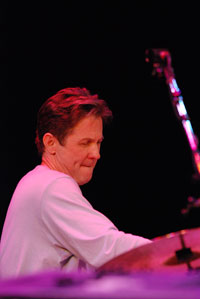"In my teaching I've noticed that many students from the United States, Europe, Japan, and Korea start off as generally 'Eurocentric' learners; that is, they learn music by reading. I try to encourage them to incorporate a more 'Afrocentric' approach, or learning by ear, stressing that accomplished musicians are expert at expanding their awareness beyond their own bubble of sound. I think this blending is a fundamental musical skill. The more you listen to the overall sound of a band as you play and try to blend with it, the more organic the music will sound."
"I also encourage my students to look beyond the music that originally inspired them, whatever the style, and go back further—to the earlier innovators—to get to the source that will better help them to develop their own distinct voice. It's just as important to be aware of the current innovators; there just needs to be a balance."
"Attitude can have a huge impact on the speed at which we learn. A dangerous attitude is when a student labels and oversimplifies a musical concept and dismisses it too easily because the term might not sound impressive. In a recent ensemble, a good bass player was having trouble improvising over a tune in G minor. He didn't have a focus in his approach, so I recommended he try G minor pentatonic. He said he didn't want to play 'autopilot pentatonic.' That stopped everything for me. I told him that I would save him years of wasting time by not trying to reinvent the wheel in order to sound completely 'original.' 'You can't discount pentatonic,' I said. 'It's probably 85 percent of the language of this music that we're playing. Learn the language of pentatonic first, innovate later.' A mindset like that is a trap I want to help students avoid."
"Lastly, I also want them to understand how many of the musical styles studied at Berklee come out of the experiences of ethnic minorities within a culture. Jazz, as an example, is primarily an outgrowth of the African American experience. It's historically important to me that they know this evolution and hopefully study more about it."

